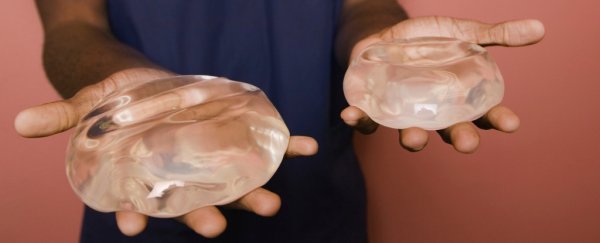Breast augmentation is one of the most popular surgical procedures in the United States, and yet it's hardly a trivial affair.
Not only do these implants require lifelong maintenance and surveillance, some types have also been linked to a constellation of worrying systemic side effects, known collectively as breast implant illness (BII).
The good news? This syndrome appears easily reversible, at least from initial studies. Following the removal of either a silicone or saline implant, new research has shown a significant and sustained improvement in nearly a dozen of the most common BII symptoms.
Today, BII is poorly defined and barely understood, even now, nearly 60 years after we first started inserting these medical devices. In fact, it might surprise you to know that for the first three decades of their existence, there was absolutely no clinical trial conducted on breast implants at all.
In the decades since, scientists have connected these devices to a higher risk of developing a rare cancer of the immune system and inflammatory reactions, particularly for women with a family history of autoimmune conditions. Meanwhile, thousands of patients have complained of fatigue, brain fog, and other problems following implantation.
When these devices are removed, past research has found it can generally improve the syndrome, but this is the first study to dig into how specific symptoms change before and after implant removal.
While the study doesn't examine cause-and-effect specifically, it does provide more evidence that removal of implants is somehow tied to BII symptoms.
The retrospective analysis examined 750 patients who had their breast implants completely removed by the same surgeon within a two-year period.
Accounting for symptoms before and after the 'explantation', the authors documented a demonstrable improvement in 11 common symptoms within the first 30 days of being implant-free. These include breast pain, hair loss, skin irritation, breathing issues, memory issues, and aches and pains.
Of course, none of this explains how these foreign objects actually trigger the many symptoms of breast implant illness, but there are hypotheses that suggest silicone breast implants can cause profound inflammation.
Not only can these devices rupture and leak inside the body, possibly even into the lymphatic system, they might also interfere with mammography, cause breast hardness, and disrupt the immune system.
"The study demonstrated a strong association of explantation and specific symptom improvement within the patient population studied," the authors write.
"Future investigation will further elucidate possible biologic phenomena to better characterise the pathophysiology and mechanism of BII."
Interestingly, for instance, the study found little difference in symptom relief after the explantation of silicone or saline implants. Removing either one helped relieve symptoms of BII, potentially because the shells of many saline implants also contain silicone.
Plus, the patients with implants who were experiencing capsular contraction - a tightening of the chest that can cause breast pain, muscle aches and difficult breathing - had the best outcomes after their removal. And this supports the idea that the immune system is somehow involved.
But there's still a lot we don't know or can't say for sure. This most recent study was based on only the most common symptoms of BII, and its sampling might be biased towards those who are having more severe issues with their implants.
What's more, the patients in this study reported on their own pre-existing conditions and the severity of their symptoms, leaving the data open to recall bias and subjectivity.
Still, the findings are a great place to start, and the authors note there is need for longer-term follow-ups in people who decide to get rid of their implants. One of the reasons breast implants are so hard to study is the proliferation of various implant types on the market; some appear to come with greater risks than others.
For a while, the FDA even put a stop to cosmetic silicone gel implants completely, allowing them only for 'reconstruction' patients willing to participate in studies. Today, the surgery is back on once again, and while it's mostly for cosmetic purposes, it's also important for cancer patients and trans women.
Last year, after forcing several companies to withdraw their implants, the FDA recommended manufacturers use a boxed warning to let patients know these are not lifetime devices, and that complications can increase over time.
The suggestion is not legally binding, and it's unclear how much effect this will have.
The study was published in the Annals of Plastic Surgery.
